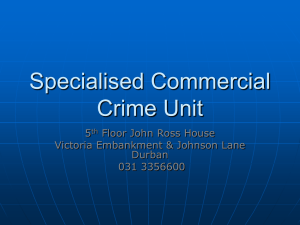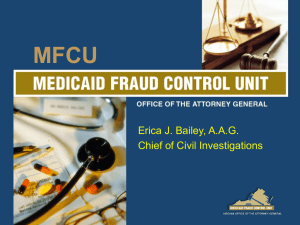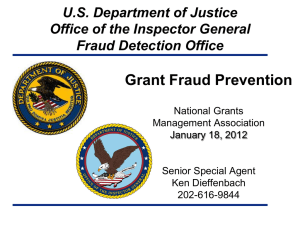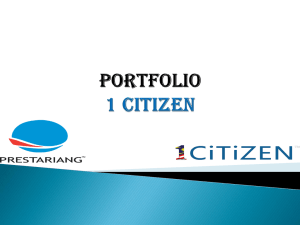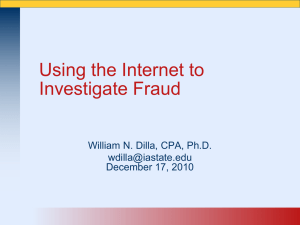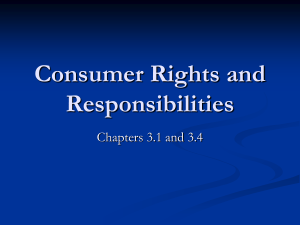ACFS Programme - Focus Training
advertisement
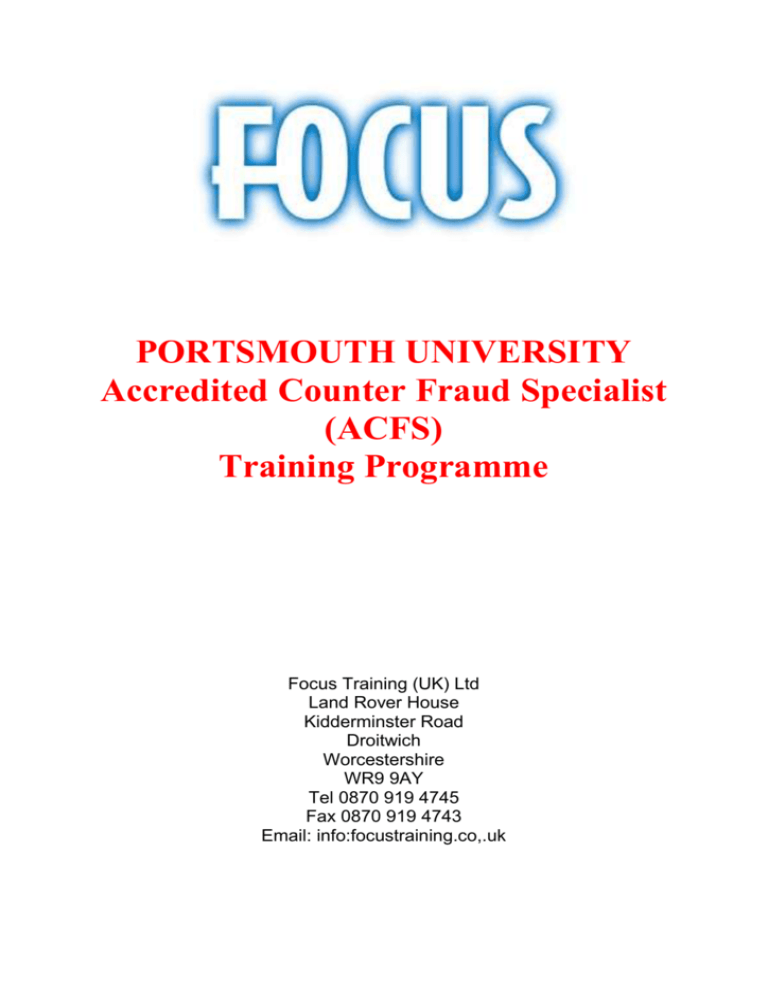
PORTSMOUTH UNIVERSITY Accredited Counter Fraud Specialist (ACFS) Training Programme Focus Training (UK) Ltd Land Rover House Kidderminster Road Droitwich Worcestershire WR9 9AY Tel 0870 919 4745 Fax 0870 919 4743 Email: info:focustraining.co,.uk UNIVERSITY OF PORTSMOUTH ACCREDITED COURSES Accredited Counter Fraud Specialist (ACFS) Training Programme A professional qualification for investigators leading to a degree with the University of Portsmouth How it works There has existed for some time the desire for a professional body to which fraud personnel can belong. This now exists with Focus. Focus provide training courses to local authorities which are accredited by the University of Portsmouth. Who Should Apply? Those whose work requires them to deal with the investigation of fraud or other financial crime within a firm (whether the threat is from internal or external sources) Fraud Investigators Fraud Managers Risk Managers Internal Auditors Insurance Officers Professional Standards staff Human Resources personnel Senior finance staff Compliance Officers The Learning Path The qualification comprises four academic modules which are delivered with a blend of distance learning, web based exam and class based learning. Each module is delivered in class over 4 days (16 Total) over 12 months. Successful completion of all four modules leads to the ACFS professional qualification and the award of 40 academic credits which can contribute towards obtaining a higher education Diploma and the Advanced Level Certified Counter Fraud Specialist (CCFS) professional qualification. This, in turn, can lead to Degree and Masters level qualifications. Organisations Working With ACFS: The ACFS qualification is awarded by the Counter Fraud Professional Accreditation Board (CFPAB), set up by the Government in 2001, with representation from many major private and public sector organisations from across the economy. Over 11,000 Counter Fraud Specialists have now been accredited at Foundation (ACFS), Advanced, Degree and Masters levels. They are supported by the Centre for Counter Fraud Studies (CCFS) which collates and makes available the latest best practice and research from across the world - and represented by the Institute of Counter Fraud Specialists (ICFS).” Department for Work and Pensions KPMG Abbey National HMRC (HM Revenue & Customs) Child Support Agency NHS Counter Fraud and Security Management Service UK Passport Service Charity Commission UK Immigration Service Numerous Local Authorities University of Teesside: Centre for Fraud and Financial Crime University of Portsmouth: Institute of Criminal Justice Studies University of Wolverhampton Institute of Counter Fraud Specialists Local Authority Investigation Officers Group (LAIOG) Capita plc CIPFA (Chartered Institute of Public Finance and Accounting) City University, London The courses Unit One. Criminal Investigation and Procedures Unit Two. Intelligence one of three options: a) Foot Surveillance b) Analysis c) Open Source Unit Three. Investigative Interviewing Unit Four. Statement Writing, Case Papers and Court Skills. The Board The Counter Fraud Professional Accreditation Board comprises: Department for Work and Pensions Identity and Passport Service Job Centre Plus Child Support Agency Local Authorities in Britain Capita (Teceris) Ltd Department of Health KPMG NHS Counter Fraud and Security CIPFA Management Service The UK Border Agency HM Revenue and Customs University of Portsmouth The Credits Scheme The Qualification. Once 40 Level One Credits have been achieved the professional accreditation body, the Counter Fraud Professional Accreditation Board (CFPAB) sit to consider the award of an Accredited Counter Fraud Specialist Certificate to the individual. Once this award is made the individual is recognised as a practitioner, skilled in the methods and procedures of counter fraud investigation. The Client may stop at this stage or may decide to move onto academic study with the University. The 40 credits gained are the equivalent of the first third of the first year’s University study. A further 80 Level One Credits attained at University qualify for a Certificate of Higher Education in Counter Fraud and Criminal Justice Studies. A further 120 Level Two Credits attracts a Diploma. 120 Level Three Credits a BSc. (Hons). 120 Level M Credits (masters) achieving a Masters. The flexibility of this programme enables the delegate to progress at their own pace and is not bound to continue onto University study unless they choose to do so. The details of each course are set out overleaf. Criminal Investigation and Procedures Course Course Duration 4 Days Target Audience All personnel involved in Law enforcement or charged with a duty of investigation that may lead to formal hearings before discipline boards, tribunals or Courts. Course Aim To provide delegates with the opportunity to examine current legislation using case studies, allowing them to develop rigorous and ethical approaches to successful investigation and prosecution. Learning Outcomes At the conclusion of the course the delegate should be able to:- Develop ethical approaches to investigation. To be conversant with legislation appropriate to their field. Understand the impact of Human Rights Legislation. Comply with Data Protection Legislation. Define the implications of the Regulation of Investigatory Powers Act. Define the application of relevant Codes of practice under Police and Criminal Evidence Act. Develop working practices that comply with disclosure rules, Criminal Procedures and Investigations Act. Plan Investigations to take account of all potential evidence trails. Identify and develop professional and accountable procedures. Course Numbers Minimum 6 Maximum 16 Module Two A Surveillance Techniques Covert Foot Surveillance Course Duration 4 Days Target Audience All personnel whose duties include being tasked to conduct covert investigation and gather intelligence or evidence. Course Aim To provide an opportunity to examine all of the legislation that impacts upon covert investigations, develop systems and procedures that are compliant, and practice skills and abilities that are necessary for the conduct of such operations. Learning Outcomes At the conclusion of the course the delegate should be able to: - Demonstrate understanding of all relevant legislation. Demonstrate practical ability in covert investigations of subjects. Perform efficiently as part of a covert team investigation. Describe the disciplines and methods of foot surveillance. Describe the methods and techniques of counter surveillance. Plan operations in full cognisance of risks and limiting factors. Prepare accurate and precise briefings to colleagues and managers. Understand and apply the learning cycle in their personnel development plans. Course numbers Minimum 6 Maximum 12 Module Two ‘B’ Fraud Intelligence Analysis Course Overall Course Aim and Outcomes Course Aim To provide an opportunity to examine legislation in relation to covert surveillance. To explore the use of CCTV and understand the legislation and codes of practice relating to its use. To establish best practice for the obtaining of intelligence and evidence from electronic devises. To develop internationally recognised methods to analyse large amounts of information using the ‘Anacapa Sciences’ fundamental concepts of investigation. Course Learning Outcomes At the conclusion of the course the delegate should be able to: Understand relevant legislation including Human Rights Act 1998, Data Protection Act 1998, Criminal procedures and investigation act 1996, Regulation of investigatory powers act 2000, Cover surveillance codes of practice, and its effect on proactive intelligence gathering. Demonstrate knowledge of planning considerations and briefing models in relation to the conduct of operations. Introduce the theory and vocabulary of the ABC system of covert foot surveillance. Understand the techniques and tactics used by surveillance operatives. Understand the codes of practice and legislation pertinent to installing, operating, storing and accessing CCVT images. Outline best practice guide to securing and seizing data from electronic devices. Describe and apply the internationally recognised intelligence cycle Describe the techniques of data collection and evaluation Describe the components of the analytical process Develop association matrices Identify and target intelligence gaps Construct charts from their analysis on any identified subject Distinguish between inductive and deductive logic Apply inductive logic to analysis Identify the components of critical thinking Develop inferences from analysis Deliver clear and concise briefings Module Two ‘C’ Proactive Intelligence Gathering Course Course Aim To provide an opportunity to examine legislation in relation to covert surveillance. To explore the use of CCTV and understand the legislation and codes of practice relating to its use. To establish best practice for the obtaining of intelligence and evidence from electronic devises. To explore legislation and techniques for internet investigation. Course Learning Outcomes At the conclusion of the course the delegate should be able to: Understand relevant legislation including Human Rights Act 1998, Data Protection Act 1998, Criminal procedures and investigation act 1996, Regulation of investigatory powers act 2000, Cover surveillance codes of practice, and its effect on proactive intelligence gathering. Demonstrate knowledge of planning considerations and briefing models in relation to the conduct of operations. Introduce the theory and vocabulary of the ABC system of covert foot surveillance. Understand the techniques and tactics used by surveillance operatives. Understand the codes of practice and legislation pertinent to installing, operating, storing and accessing CCTV images. Outline best practice guide to securing and seizing data from electronic devices. Investigative Interviewing Course Course Duration 4 Days Target Audience All personnel engaged in interviews intended to gather information from which conclusions can be drawn. Course Aim To provide an opportunity for delegates to conduct investigative interviews, using familiar interview situations, to a nationally recognised model that develops best practice and communication skills. Learning Outcomes At the conclusion of the course the delegate should be able to: Apply the codes of practice in relation to interview procedures. Manage disclosure of evidence prior to interview fairly with full knowledge of its implications. Be aware of legislative requirements for inference at Court. Explain the legislation and its interpretation for dealing with witness interference. Apply best practice when managing critical incidents during interviews. Understand handling documentary and physical exhibits during interviews. Understand how to support witnesses when attending Courts or tribunals. Course Numbers Minimum 6 Maximum 8 Statement Writing, Case Papers & Court Skills Course Course Duration 4 Days Target Audience Individuals who prepare evidential statements, case papers and provide evidence of fact or expert opinion at Courts or Tribunals. This course may be tailored to meet client needs. Course Aim To ensure Investigators understand the rules of evidence in relation to statements and produce clear and concise statements of evidence. To enable Investigators to effectively prepare evidential files to the standards required by the Crown Prosecution Service for all levels of the Court System. To enhance the Investigators understanding of the court system and rules of evidence, whilst improving their ability to give evidence. Learning Outcomes At the conclusion of the course the delegate should be able to: Understand the process of statement preparation. Prepare witness statements to an evidential standard. Exhibit knowledge of Court Files required by the Crown Prosecution Service. Understand the respective files required in the light of plea indications. Understand disclosure in relation to files and court procedures. Exhibit knowledge of the relevant rules and Laws of Evidence. Understand Court Procedures & Etiquette when attending Court. Discuss the effect of using notes when giving evidence. Appreciate the importance of pre-court preparation. Discuss the respective roles of participants in the Court process. Course Numbers Minimum 6 Maximum 8 How to Book Book on line at http://www.focustraining.co.uk/enquiry.aspx?ID=86 In house training courses can be booked for any mutually convenient period. For pricing & conditions, Email: info@focustraining.co.uk To discuss any aspect of your ACFS training requirement or to discover more training options provided by Focus please contact us on 0870 919 4745. Focus also provide skills based training courses which are not accredited by Portsmouth University including: Anacapa Science Intelligence Analysis Interview Skills Open Source Internet Investigation Case Papers and Report Writing Planning Legal and Ethical Fraud Enquiries/Investigations Advanced Excel Insurance Fraud training i2 Analysts Notebook

